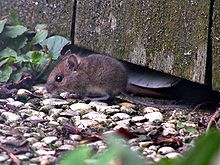নিগনি
Appearance
See also: নগ্ন
Assamese
[edit]
Alternative forms
[edit]Etymology
[edit]Inherited from Early Assamese নিঙ্গনি (niṅgoni), from Magadhi Prakrit *𑀦𑀺𑀓𑁆𑀔𑀦𑀻 (*nikkhanī), from Sanskrit *নিঃখনিকা (niḥkhanikā, “rat”). Cognate to Kamta নেকনাই (neknai), নেকেনাই (nekenai), ন্যাখেনাই (nyakhenai).
Pronunciation
[edit]Noun
[edit]নিগনি • (nigoni)
Classifier
[edit]Declension
[edit]| Declension of নিগনি | |
|---|---|
| nominative | নিগনি / নিগনিয়ে nigoni / nigonie |
| genitive | নিগনিৰ nigonir |
| nominative | নিগনি / নিগনিয়ে nigoni / nigonie |
| accusative | নিগনি / নিগনিক nigoni / nigonik |
| dative | নিগনিলৈ nigoniloi |
| terminative | নিগনিলৈকে nigoniloike |
| instrumental | নিগনিয়ে / নিগনিৰে nigonie / nigonire |
| genitive | নিগনিৰ nigonir |
| locative | নিগনিত nigonit |
| Notes | |
| Noun: Assamese nouns are indefinite. They can be both singular and plural depending on the context. They are made definite by using classifiers and plural suffixes which also make them either singular and plural. Plural: The general plural suffixes are: -বোৰ (-bür) and -বিলাক (-bilak) (less common). Others which have specific functions include -সমূহ (-xomuh), -সকল (-xokol), -হঁত (-hõt) etc. Nominative: The -এ (-e) suffix is used when the noun works as an agent and the verb is transitive. Accusative: -অক (-ok) is used for animate sense and for emphasis. No case marking otherwise. Dative 1: For direct objects -অক (-ok) marks this case instead of -অলৈ (-oloi). Dative 2: In some dialects -অক (-ok) or -অত (-ot) marks this case instead of -অলৈ (-oloi). Terminative: Vaguely -অলৈ (-oloi) can mark this case too. Instrumental 1: -এ (-e) is unemphatic and -এৰে (-ere) is emphatic and more common. Instrumental 2: Alternatively -এদি (-edi) is used instead of the default -এৰে (-ere) in Standard Assamese. Locative: The locative suffix is -এ (-e) in repetition of the word, with adverbs and days of the week. | |
See also
[edit]- এন্দুৰ (endur)
Categories:
- Assamese terms inherited from Early Assamese
- Assamese terms derived from Early Assamese
- Assamese terms inherited from Magadhi Prakrit
- Assamese terms derived from Magadhi Prakrit
- Assamese terms inherited from Sanskrit
- Assamese terms derived from Sanskrit
- Assamese terms with IPA pronunciation
- Assamese lemmas
- Assamese nouns
- Assamese terms with usage examples
- as:Mammals

